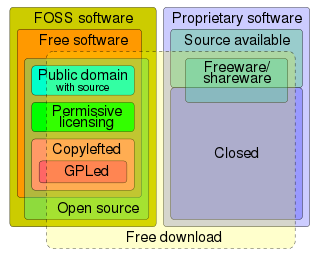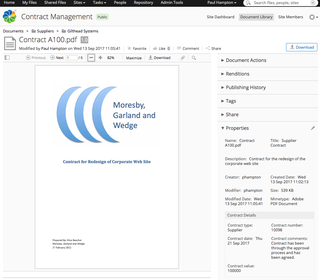
Software consists of computer programs that instruct the execution of a computer. Software also includes design documents and specifications.

Free software, libre software, libreware sometimes known as freedom-respecting software is computer software distributed under terms that allow users to run the software for any purpose as well as to study, change, and distribute it and any adapted versions. Free software is a matter of liberty, not price; all users are legally free to do what they want with their copies of a free software regardless of how much is paid to obtain the program. Computer programs are deemed "free" if they give end-users ultimate control over the software and, subsequently, over their devices.

A software license is a legal instrument governing the use or redistribution of software.
In library and archival science, digital preservation is a formal process to ensure that digital information of continuing value remains accessible and usable in the long term. It involves planning, resource allocation, and application of preservation methods and technologies, and combines policies, strategies and actions to ensure access to reformatted and "born-digital" content, regardless of the challenges of media failure and technological change. The goal of digital preservation is the accurate rendering of authenticated content over time.

Alfresco Software is a collection of information management software products for Microsoft Windows and Unix-like operating systems developed by Alfresco Software Inc. using Java technology. The software, branded as a Digital Business Platform is principally a proprietary & a commercially licensed open source platform, supports open standards, and provides enterprise scale. There are also open source Community Editions available licensed under LGPLv3.

DSpace is an open source repository software package typically used for creating open access repositories for scholarly and/or published digital content. While DSpace shares some feature overlap with content management systems and document management systems, the DSpace repository software serves a specific need as a digital archives system, focused on the long-term storage, access and preservation of digital content. The optional DSpace registry lists almost three thousand repositories all over the world.

Fedora is a digital asset management (DAM) content repository architecture upon which institutional repositories, digital archives, and digital library systems might be built. Fedora is the underlying architecture for a digital repository, and is not a complete management, indexing, discovery, and delivery application. It is a modular architecture built on the principle that interoperability and extensibility are best achieved by the integration of data, interfaces, and mechanisms as clearly defined modules.

Aptana, Inc. is a company that makes web application development tools for use with a variety of programming languages. Aptana's main products include Aptana Studio, Aptana Cloud and Aptana Jaxer.

Jira is a proprietary product developed by Atlassian that allows bug tracking, issue tracking and agile project management. Jira is used by a large number of clients and users globally for project, time, requirements, task, bug, change, code, test, release, sprint management.

A digital library is an online database of digital objects that can include text, still images, audio, video, digital documents, or other digital media formats or a library accessible through the internet. Objects can consist of digitized content like print or photographs, as well as originally produced digital content like word processor files or social media posts. In addition to storing content, digital libraries provide means for organizing, searching, and retrieving the content contained in the collection. Digital libraries can vary immensely in size and scope, and can be maintained by individuals or organizations. The digital content may be stored locally, or accessed remotely via computer networks. These information retrieval systems are able to exchange information with each other through interoperability and sustainability.

MindTouch was an American multinational technology company headquartered in San Diego, California, that designed, developed, and sold SaaS computer software and online services. MindTouch was founded by Aaron Fulkerson and Steve Bjorg in 2005. In January 2016, MindTouch announced their Series A Venture Capital funding round, totaling US$12 million. PeakSpan Capital led the round with participation from SK Ventures and SAP SE. In April 2021, MindTouch was acquired by NICE CXone and rebranded NICE CXone Expert.

AppScale is a software company that offers cloud infrastructure software and services to enterprises, government agencies, contractors, and third-party service providers. The company commercially supports one software product, AppScale ATS, a managed hybrid cloud infrastructure software platform that emulates the core AWS APIs. In 2019, the company ended commercial support for its open-source serverless computing platform AppScale GTS, but AppScale GTS source code remains freely available to the open-source community.
A library consortium is any cooperative association of libraries that coordinates resources and/or activities on behalf of its members, whether they are academic, public, school or special libraries, and/or information centers. Library consortia have been created to service specific regions or geographic areas, e.g., local, state, regional, national or international. Many libraries commonly belong to multiple consortia. The goal of a library consortium is to amplify the capabilities and effectiveness of its member libraries through collective action, including, but not limited to, print or electronic resource sharing, reducing costs through group purchases of resources, and hosting professional development opportunities. The “bedrock principle upon which consortia operate is that libraries can accomplish more together than alone.”
CloudStack is open-source Infrastructure-as-a-Service cloud computing software for creating, managing, and deploying infrastructure cloud services. It uses existing hypervisor platforms for virtualization, such as KVM, VMware vSphere, including ESXi and vCenter, XenServer/XCP and XCP-ng. In addition to its own API, CloudStack also supports the Amazon Web Services (AWS) API and the Open Cloud Computing Interface from the Open Grid Forum.
DuraSpace was a 501(c)(3) not-for-profit organization founded in 2009 with the merger of the Fedora Commons organization and the DSpace Foundation, two of the world's largest providers of open source digital repository software. In 2011, DuraSpace launched DuraCloud, an open source digital preservation software service. In July 2019, DuraSpace merged with Lyrasis, becoming a division of that organization.

Samvera, originally known as Hydra, is an open-source digital repository software product. Samvera main components are Fedora Commons, Solr, Blacklight, and HydraHead. Each Samvera implementation is called a "head". "Samvera" is Icelandic for "togetherness".
Microsoft, a tech company historically known for its opposition to the open source software paradigm, turned to embrace the approach in the 2010s. From the 1970s through 2000s under CEOs Bill Gates and Steve Ballmer, Microsoft viewed the community creation and sharing of communal code, later to be known as free and open source software, as a threat to its business, and both executives spoke negatively against it. In the 2010s, as the industry turned towards cloud, embedded, and mobile computing—technologies powered by open source advances—CEO Satya Nadella led Microsoft towards open source adoption although Microsoft's traditional Windows business continued to grow throughout this period generating revenues of 26.8 billion in the third quarter of 2018, while Microsoft's Azure cloud revenues nearly doubled.











